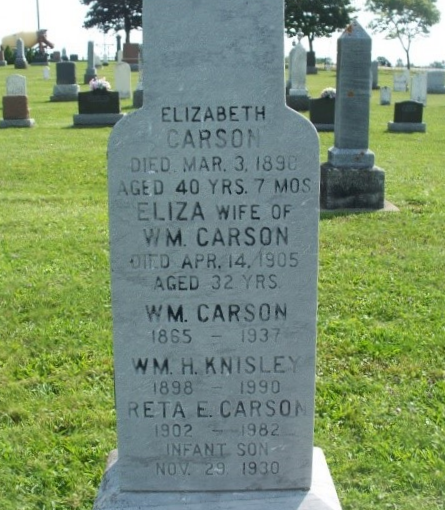838815 Pte William Henry Knisley was born on 8th August 1898, in Wellington County, Ontario, to Abraham and Sarah Knisley. The family eventual moved to Durham, Grey County, where William found work as a farmer labourer. Just shy of being of age to enlist by nearly half a year, someone fudged his birth date to 1897, to ensure he would not be turned down.
Seventeen year old Willam attested to the 147th Battalion on 14th February 1916 and was billeted locally over the winter, until the unit left for centralized training at Camp Niagara in the spring. As the conditions in the Camp were wanting the unit was moved to the new training facility of Camp Borden in late June. In late September the unit finally received its orders to proceed overseas. The unit departed Camp Borden on October 6th, by train for the Port of Halifax. Unfortunately, they were detained in Amherst, Nova Scotia, for over a month when a number of soldiers contracted diphtheria. The unit finally sailed for Great Britain on the Olympic, on 14th November 1916.

On 1st January 1917, the 147th Battalion ceased to exist when it became the nucleus for the 8th Reserve Battalion, whose task it was to supply reinforcements to the 58th Battalion and the 4th C.M.R. Private Knisley was taken on strength of the 4th C.M.R. on 22nd April 1917 while the Battle of Arras was still raging. Due to the strain the battle was putting on the military transportation system it took five days for him to report in for duty.
Serving through the summer, Willaim was with the unit at the 3rd Battle of Ypres. A battle more known for where it ended: Passchendaele. Coming through the mud and horror of that battle unscathed, he was admitted to hospital in November with appendicitis. There he was diagnosed as being a diphtheria carrier, a designation that saw William sitting out the remainder of the war in England.
After the Armistice was signed, William's services were no longer required and he was amongst the first to be sent home for demobilization aboard the H.M.T. Melita, in December 1918. Arriving in St. John, New Brunswick, on December 12, 1918 he boarded a train for Toronto, where he was given leave, as it was the holiday season.
838815 Lance Corporal William Henry Knisley was struck off strength of the C.E.F. on 16th January 1919. Returning to Durham he married Margarite Carson and the couple would have nine children. William passed away on 10th April 1990, and was laid to rest in Durham's Maplewood Cemetery.
Biography credit: George Auer, with thanks.